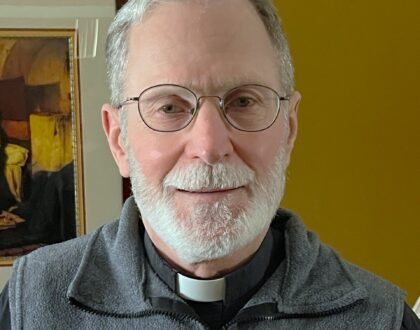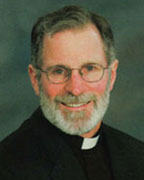Sunday, November 5, 2023

From The Pastor
I do not know the origin of the phrase, but it is a good fit for religion and the spiritual life. ‘If you talk the talk, can you walk the walk?’ To walk the walk is to back up the talk with action. This is a truism in Christianity. It is comparative to faith and works. Some say redemption is by faith alone. Others believe it depends on works that puts faith into action. What is the answer to the riddle? The answer is ‘yes,’ it takes faith in action to walk the path of a redeemed life.
We are finishing a section in Matthew’s gospel where the Scribes and Pharisees seek to discredit the words and works of Jesus. The primary movement of their jealousy exposes the hypocrisy of those who present themselves as teachers of the Mosaic Law yet neglect its practice.
Today’s reading begins a new section that leads to a series of ‘woes’ spoken by Jesus against false religion and those who use God and religion for their own gain. We have pondered these issues through the virtue of truth. Jesus is the truth of God confirmed in the visible and living evidence of his constancy, fidelity, and merciful compassion. The words and the works of Jesus match. He speaks of love, forgiveness, and mercy. His words are confirmed in deeds of compassionate acceptance shown to sinners through merciful forgiveness.
It might seem the harsh words of Jesus are out of character for his gentle manner. This is not the case. Jesus speaks truth to power that cannot be denied or defended. Why is Jesus so strong against the leaders of his own religion as a Jew? As the revelation of Divine Love, Jesus lived above both the blessings and limitations of church religion. Jesus deeply valued his Jewish faith but would not tolerate hypocrisy against the name and nature of the living God.
What is the evidence? Jesus tells the crowd and the disciples to follow the teachings of the Scribes and Pharisees, but not to follow their example. Their teaching was true, but their example and way of life betrayed what they taught. Jesus wished to expose the mask of their false piety against God and the people.
Some religious leaders of Jesus’ day, and our own, became more enamored with their role and position of honor and importance more than for the honor and glory of God. Believers suffered the loss of knowing God’s true nature.
Living behind an ego of self-importance, some religious leaders lost the ability to hold faith as effective agents of God for others. These leaders lost the capacity and desire to trust the possibility of a self-surrendering God of love and mercy who is generous to both saints and sinners. God had become the mask of a pious ego in the desire for honor and importance that only serves the self. Such a stance blocks them from knowing the living God. It also hinders the faith of those who long for a God of love, acceptance, and hope for salvation.
Every human being seeks love. But love is hard with painful losses and disappointments. Seeking a path of ego comfort through power and self-importance is an easy temptation. However, it comes at a heavy cost. Such a person will not know them self in a true way. They lose the capacity for mature and life-giving relationships of love. Love is present but denied or buried under the mask of inflated self-importance.
What is the remedy for living in a false self? This is the challenge and the grace of a life-long effort to know yourself as loved and valued by God. Saint or sinner, God values each of us through the undeniable mercy and sacrifice of the Lord Jesus. To know and love yourself will reveal your inner power. This kind of power grows from secure faith, maturing love, and persistent hope. It matures with self-honesty and forgiveness through which a person finds peace with themself.
This kind of self-awareness means a person’s inside and outside match. The peace and goodness of self-love on the inside is evident in the acceptance and love of others on the outside. Too often people present a pious outside image that betrays a lack of peace or virtue on the inside. Persistent inner division makes it increasingly difficult to engage in active trust of the Lord’s mercy.
This may sound like a lot of work that could be scary and easily resisted. This may be true, but it is also the reason it is so important. A simple way to think about this is to ask yourself, is my life moving toward God or away from God? Am I happy or unhappy with myself? Can I name the cause of my unhappiness? Am I secure enough to bring my feelings and concerns to God with confidence that God will kindly hear me? Do I trust God’s goodness?
These are simple movements of faith that can reap great rewards. Such work can save us from the masks and defenses that block us from God and others. To humble yourself is to find God. To exalt yourself falsely is to lose the truth of your inner goodness and the peace of knowing yourself in Christ.
Father John Esper
Recent Sermons

Homily, March 30, 2025
March 27, 2025

Homily, March 23, 2025
March 20, 2025

Homily, March 16, 2025
March 11, 2025

